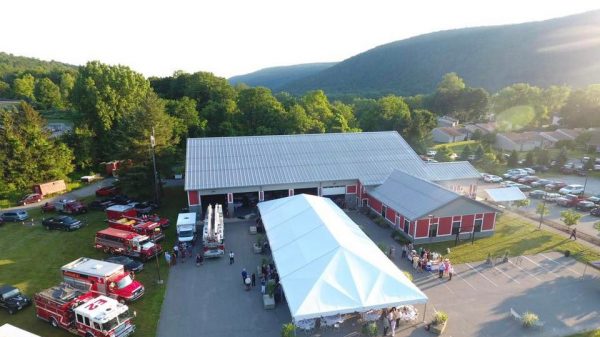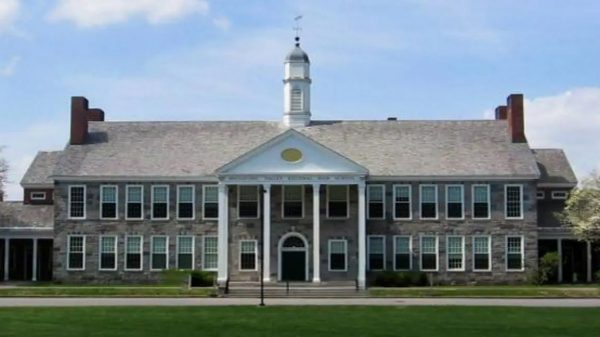KENT—The townspeople voted 120-21 at a special town meeting Friday, April 26, to enter a conditional agreement with Kent Affordable Housing for the transfer of 1.16 acres of land adjacent to the South Commons affordable housing project for the construction of about 10 additional dwelling units.

The parcel of land is surrounded by town-owned properties dedicated to municipal uses such as the transfer station, park and recreation and the Department of Public Works. Much of the discussion at the meeting was dedicated to whether it is best to use the land for affordable housing—seen as a pressing need—or for possible future expansion of the other municipal uses.
It was noted that Kent, which has become a popular destination place for both daytrippers and second-home owners, will inevitably grow in coming decades. “It is not a question of if the Department of Public Works will need to expand, but when,” said resident Lynn Harrington.
Others echoed her concerns about the need to expand the transfer station, as well, which is currently grandfathered and does not meet existing codes.
First Selectman Marty Lindenmayer said there had been extensive negotiations with Park and Recreation and the Department of Public Works about the potential transfer of the land to Kent Affordable Housing and that the original request for 1.6 acres had been pared down to 1.16 acres.
“The parcel was trimmed,” he said. “Park and Rec and the DPW found it acceptable—not optimal, but acceptable. We came to the conclusion to allow Kent Affordable Housing to consider it under certain conditions. There are rigorous constraints and it can’t be transferred until it passes all of them.”
If Planning and Zoning and the Inland Wetlands Commission, for instance, cannot approve applications for development of the land, it will revert to town ownership. KAH must also go through application processes for state and federal funding.
In response to repeated comments that the town should be cautious about giving away property it might need for municipal needs, Lindenmayer said, “This has been ongoing for quite a while and other boards have looked at this. Do we want DPW and the transfer station to expand in the middle of town? There are no plans for those areas now. That parcel is available to expand South Commons. It’s contiguous to South Commons …and this is the best way, we think, to help our community.”
It was noted that there are wetlands on the property that the town would have to contend with before it could extend any municipal uses.
Justin Potter, president of Kent Affordable Housing, said affordable housing is referenced repeatedly in the town’s Plan of Conservation and Development and the town’s Housing Plan encouraged use of town-owned land for affordable housing development. The POCD has no mention of needing to expand the transfer station or the DPW.
He said the availability of sewer and water is crucial to the creation of high-density affordable housing. “Only a tiny portion of [available] land in town has public water and sewer. We went to Cardinal Engineering and it found the South Commons infrastructure could support additional units. The Department of Housing is only interested in projects of 10 units or more and here we have the existing infrastructure.”
Gary Ford, a member of KAH’s Board of Directors, said, “If you are talking about concerns and issues, we need to take into account three big problems. Young people have no place to live, a way disproportionate number of young people are living with their parents. Old people often move away because there is no place for them to go, and we can’t get enough workers for our retail and restaurants, because people in those jobs can’t afford to live here.”
Megan Haney, who leases land from the Kent Land Trust for her Marble Valley Farm, said she has had multiple applicants for the farm from “great candidates who then withdraw their applications because they can’t find housing. It has definitely impacted my farm. I’ve had to cut back my scale of farming 50 percent in the last five years.”
But Lynn Harrington, former treasurer of Kent Affordable Housing, questioned the wisdom of transferring the land. She recounted the evolution of the town from a busy farming community to the destination town it has become today.
“How did we get here and why did we get here?” she asked. “Was it Yankee magazine writing about us as a top destination place? Is it Tripadvisor writing about how beautiful our town is and why you should come here? Is it the preacher who comes to Bulls Bridge and goes home and tells his friends about it? Is it people coming from higher-price places and buying houses? Is it the retired farmer who chooses to sell his farm because his children don’t want to farm anymore [because of government mandates]. Is it because of someone who sees the farmer’s land for sale and buys the farmhouse and 200 acres of land and then tears down or rebuilds the house and a real estate agent values it at over a million dollars?” When we have a revaluation, everyone’s values go up. Is it overspending from the government that makes it impossible for people to live here and then the government turns around a gives handouts for housing like this? Out tax dollars will pay for this project.”
She listed reasons the parcel would not be appropriate for affordable housing and urged caution in giving away land that could be used for expanded municipal services. She mentioned other ways to provide affordable housing, including inclusionary housing, where the residents could set their own policies, and the imposition of a tax on the sale of expensive properties to create a fund for land acquisition. She said “no frills, deed-restricted” homes could be developed on the land.
She said the town might regret “knowing we had land we knew were going to need … for 3,500 people and gave it away for 10 apartments.”
Austi Brown recognized the “valid concerns” being expressed but noted that the need for affordable housing is acute. “The 10 units … is just a small portion of what is needed,” she said. “The need for affordable housing is now. There’s a lot of discussion about who applies for and get housing. We can’t limit it to just Kent, but most people who end up here have a connection to Kent.”
Potter addressed the issue of funding, saying it would come from the state and federal governments. “Operating expenses come from rents,” he said adding that local taxation will benefit because the land would come back on the tax rolls. KAH pays some $25,000 in taxes each year.
A sea of hands shot up when the question of approving the conditional agreement went to a vote.

































